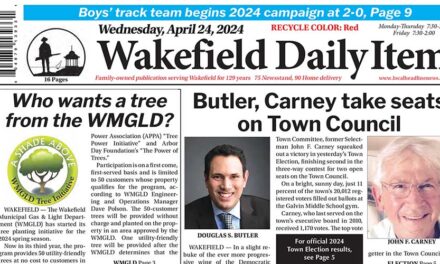Published in the June 22, 2017 edition.
By MARK SARDELLA
WAKEFIELD – There are upwards of 20 group homes of various types in the town of Wakefield and sometimes they cause problems for their neighbors.
The question of what can be done about these issues was the subject of a town-sponsored forum last night at The Savings Bank Theater in Wakefield High School attended by about 50 town residents. The answer was that, at the local level at least, not much can be done about group homes. Changing that will require action by the state legislature, according to Town Counsel Thomas Mullen and Town Administrator Stephen P. Maio.
Maio noted that the town’s state legislative delegation had planned to attend the forum but the legislature was in session last night. He promised to forward all the comments from the forum to the legislators.
Maio said that Wakefield had a proud history of working with group homes run by state and local agencies like EMARC, Riverside Community Care and the Department of Youth Services. Those tend to not be the main subject of complaints, he said.
But due to some recent changes in insurance and health care laws, the town is seeing a growing number of sober houses that serve people recovering from substance abuse as an interim environment between rehab and mainstream society, Maio said. Some of those homes try to get as many clients as they can into the home and it can cause issues with neighbors.
He said that under state and federal law group homes are basically exempt from zoning. A group home with 12 residents, for example, must be treated the same as a large family occupying a single-family dwelling. He said that because they are not subject to specific local regulations, often these homes appear without Town Hall knowing about them until there is a complaint.
Mullen agreed with Maio’s assessment that the town cannot treat group homes any differently than a family living in a single residence district.
“The Fair Housing Act makes it a civil rights violation not to accommodate a group home,” Mullen said. He added that absent changes at the state and federal level, it would be unwise for the town to try to prohibit group homes. He said that complaints could be filed with regulators or with the funding agency of a group home that gets out of hand.
“But they may choose to do nothing,” he said.
Citing Lynnfield as an example, he noted that affluent towns that don’t have sewer systems can have some control or group homes by using septic regulations to limit the number of beds in a single residence. He called upon state and federal officials to address this inequity.
Caroline Ciampa of Lafayette Street noted that there are two group homes on her street and wondered why sober houses are allowed in quiet neighborhoods. Maio said that under federal law residents of sober houses are considered to have a disability.
“We’re looking for peace and quiet and were not even getting that,” Ciampa said, “and we’re taxpayers here.”
Former Selectman Jim Scott recalled that even when he was on the board, Wakefield seemed to have more than its share of group homes. He wondered why surrounding towns weren’t required to do their fair share.
Deborah Ulrich of Lafayette Street asked why a sober house was allowed to open on Lafayette Street when there was already a group home for troubled adolescent girls on the street. She said that there should be some way to prevent that kind of concentration in one neighborhood. She advised anyone who has suffered negative effects from a group home in their neighborhood to file for a tax abatement.
Maio noted that the group home for teenage girls is moving out.
Irene Bremis of Lake Shore Drive talked about a sober house in her neighborhood. She complained of speeding, parking and trash issues.
Jim Diminico said that he lived on Heather Lane, next door to a group home for people with disabilities. He said that he has heard loud screaming and other noise not typical of a single-family neighborhood. He told of overflowing trash barrels and said that his neighbor has found medical waste in her flower beds.
He said that he has spoken to the agency that runs the home as well as is local employees but has gotten nowhere.
“The quality of life at the Diminico house stinks,” he said.
In response to another question, Mullen said that group homes are subject to the same noise and parking regulations as any other home. He said that some of what he was hearing was not very different than typical neighborhood complaints.
Bronwyn Della-Volpe of Byron Street recommended persistent, frequent calls to legislators, noting that such pressure can get results.
Catherine Taatjes of Green Street suggested complaining to the funding agencies of problematic group homes and calling police consistently when there are issues.
Peter McManama of June Circle noted that the growth of sober houses was a result of changing health care laws and the opioid epidemic. He suggested that after a period of growing pains, competition would weed out the bad sober homes, but it would take time.
Heather Marino of Holland Road noted that group homes are businesses and wondered why they are not subject to the same laws as other businesses. She traced the origins of group homes back to the de-institutionalization movement of the 1970s. She said that often the clients of these homes are not having a good quality of life.
Jack Palano of Turnbull Avenue said that he owns several downtown properties and has seen things like drug dealing, indecent exposure and loud profanity. He noted that owners of group homes get premium rents. He wondered if taxing them at a higher rate could have an impact.
Another downtown business owner, Adele Carchedi, said that she has had problems with group home clients soliciting in and around her Albion Street hair salon. She said that her yard on Hancock Road abuts the group home on Lake Shore Drive. She described 20-25 people smoking on an outside porch. The coughing, she said, “sounds like a TB clinic.” She said that the home frequently has meetings outside. She has resorted to keeping her shades down for privacy.
“I feel like I’m living in hell,” she said. “I’ve lost my life. Thirty years I’ve been there and no one can help me.”
Lily Denis of Lakeshore Drive said that you can talk to neighbors when there are problems, but that is not usually the case with sober houses with transient populations.
Patrick Bruno of MacKenzie Lane urged the town to step up inspections of group homes by the building, health and Fire Departments to try to get some control.
Selectman Edward Dombroski encouraged residents who are having issues with group homes to reach out to him and other town officials.
“We will do what we can,” he said.




